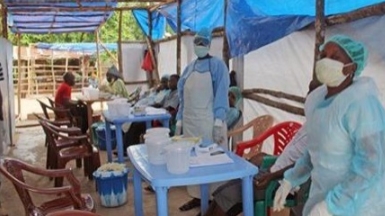
The National Institutes of Health (NIH) announced Thursday that a vaccine for the Ebola virus will be tested on humans by September.
Researchers have been developing a vaccine for years, and have had successful results in primate testing. News of the vaccine comes as West African countries are fighting to contain a deadly outbreak.
The director of the National Institute of Allergy and Infectious Diseases, Dr Anthony Fauci, said that the trials will begin in the coming weeks, with results available by early 2015.
According to the Center for Disease Control and Prevention, Ebola virus disease, or Ebola hemorrhagic fever, typically causes fever, diarrhea, vomiting, headache, joint pain, and other symptoms.
The disease is transmitted by coming into contact with the bodily fluid of an infected person, or touching objects such as needles that have come into contact with infected bodily fluid.
The outbreak began in southern Guinea in February, and quickly spread to Liberia and Sierra Leone. At least 672 people have been killed by the virus, and there is no cure. The mortality rate of the current outbreak is 60 percent.
Top Ebola physician Dr Sheik Umar Khan died in Sierra Leone less than a week after testing positive for the virus, and two American health care workers, including one serving with Samaritan's Purse, were infected after working at the Ebola Consolidated Case Management Center in Liberia.
On Wednesday, Sierra Leone President Ernest Bai Koroma declared a state of emergency to combat the outbreak.
Security forces will be called in to help police traffic in and out of the epicentres, and will help protect health workers and charity organisations working in the country. There have been reports of health care workers being attacked, and infected patients being forcibly removed from health centers by family members.
Some citizens who tested positive for Ebola have fled hospitals and are in hiding, and President Koroma said that authorities will search for them house-to house.
There will also be new procedures for persons travelling in and out of the country's Lungi International Airport, but Koroma did not provide details of the new protocols.













